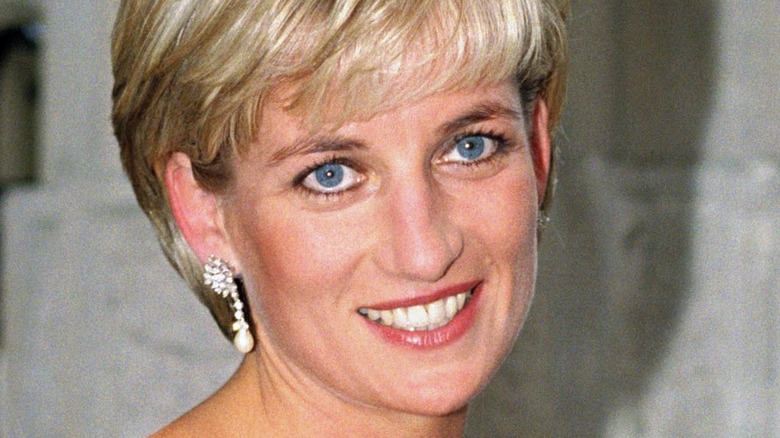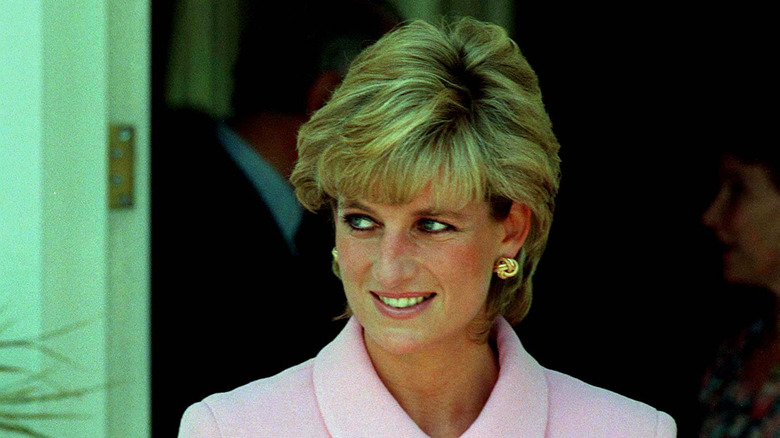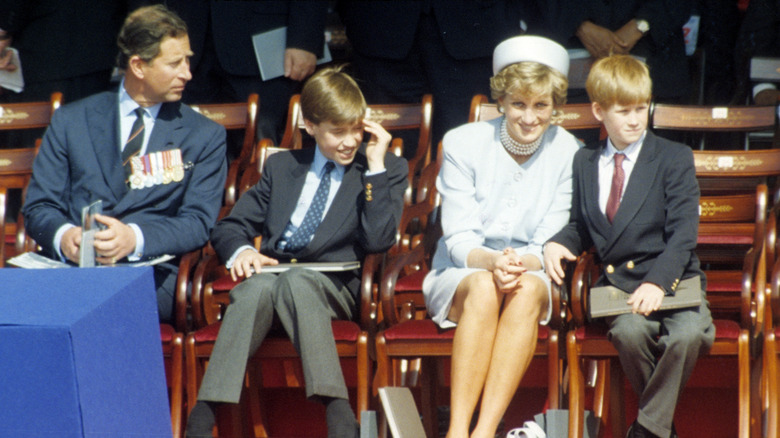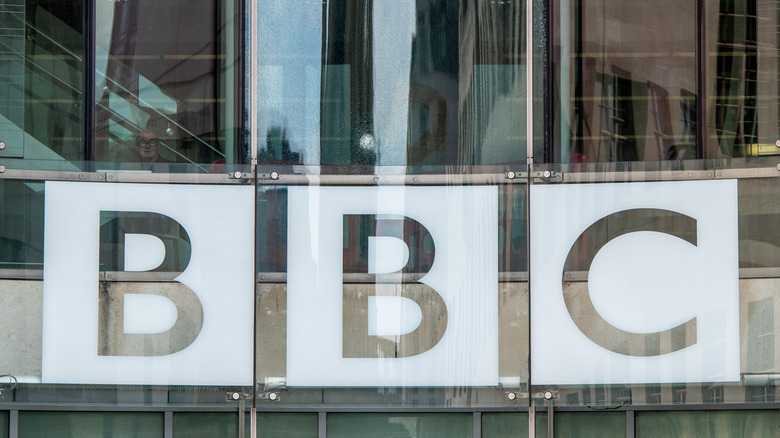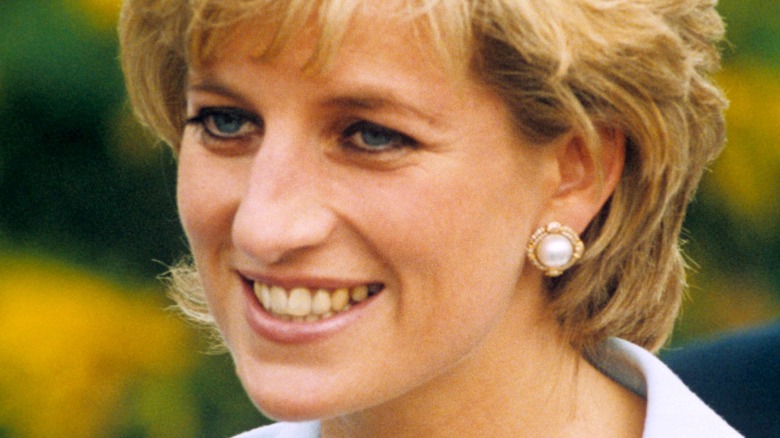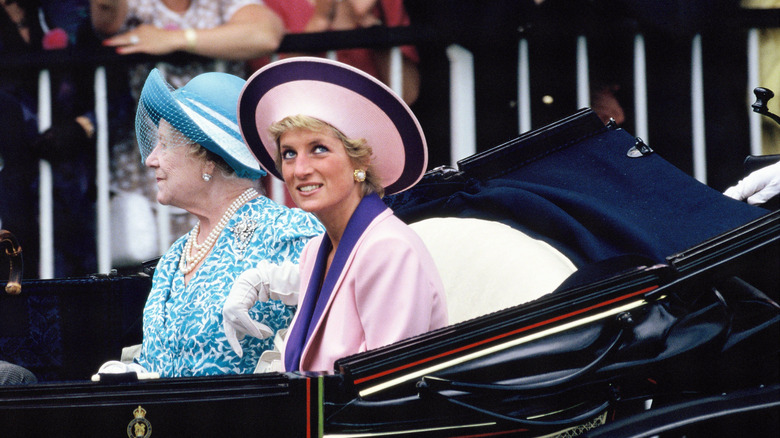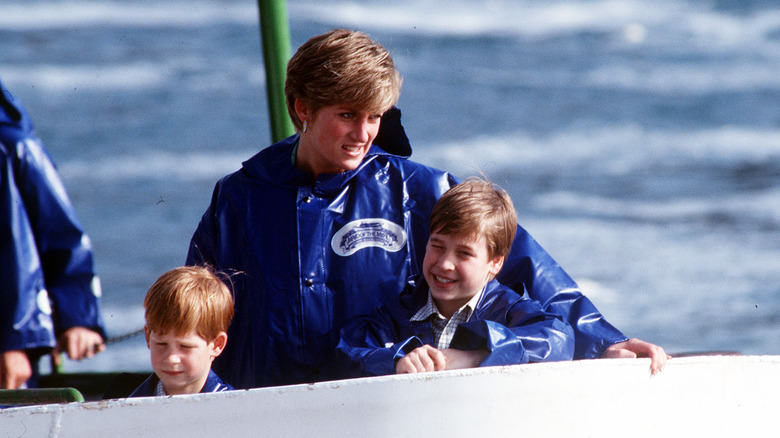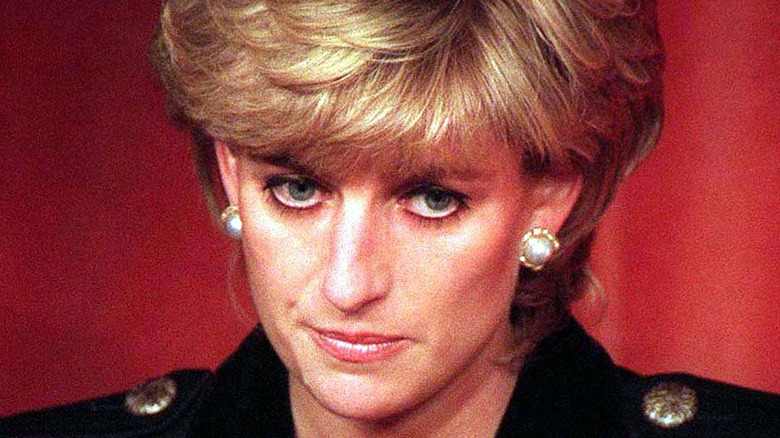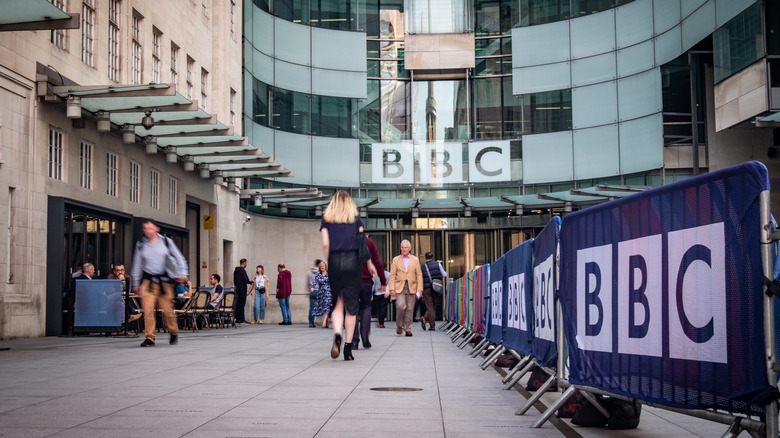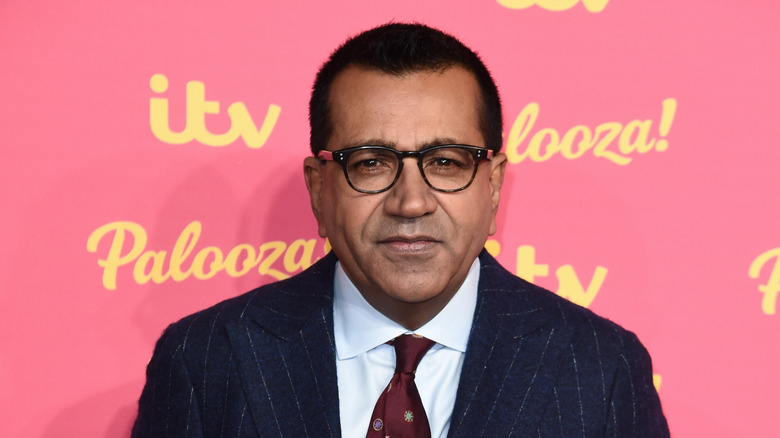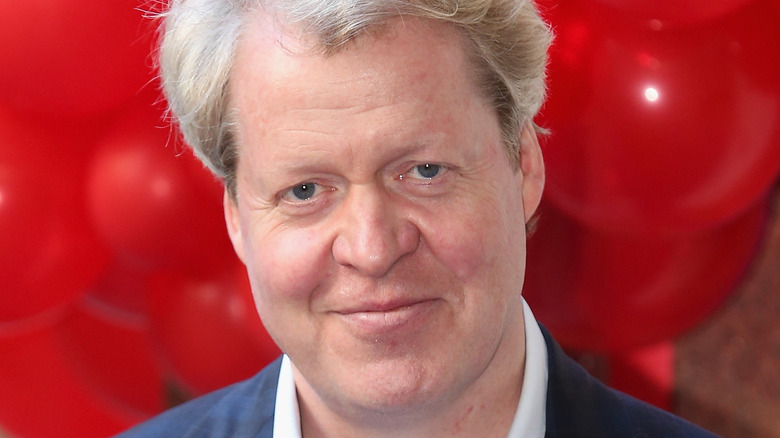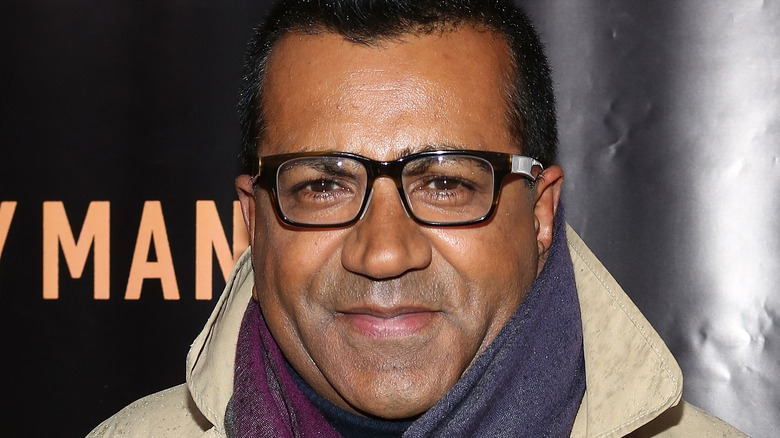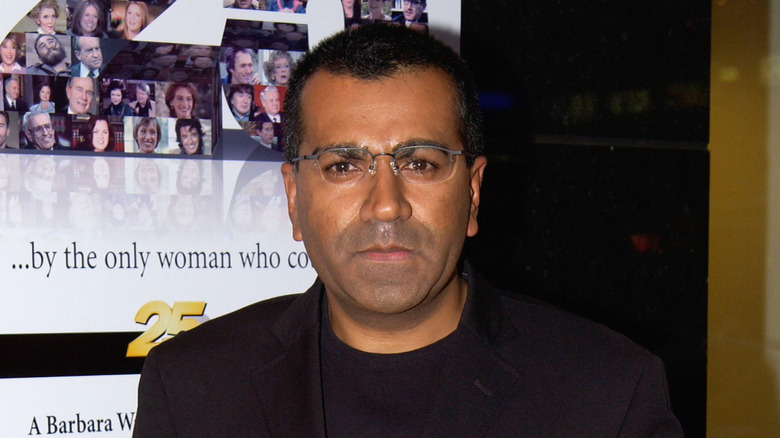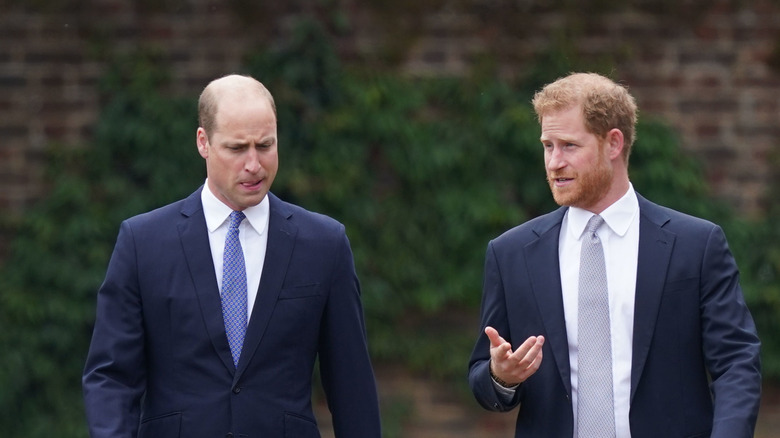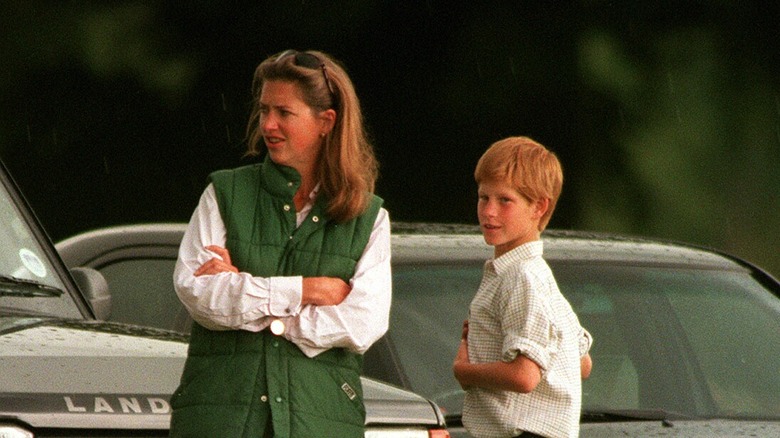The Truth About Martin Bashir's Controversial Interview With Diana Spencer
To say that it was the interview heard around the world is an understatement — yes, we're talking about the infamous sit-down interview between Princess Diana Spencer and the BBC's Martin Bashir that all but aired the royal family's dirty laundry for the world to witness. It was 1995, and while Diana and Prince Charles were still married, they had been separated for three years at the time of the interview (via History). Rumors of infidelity, potential emotional abuse, and tension with other royal family members were certainly circulating, but Diana's interview seemed to confirm the fears of many — that she was at the mercy of a system that did not, in any way, support her.
The interview has been used in many settings in the many years since it first aired — it's often pointed to as one royal's attempt to shed light on the archaic system that has plagued the royal family for generations. Years later, when Prince Harry and Meghan Markle sat down with Oprah Winfrey, ties to Diana's interview were made yet again. But with time, the interview with Bashir has come under intense scrutiny, with the realization that the admissions made on camera were not nearly as supported as we may have thought. This is the truth about Martin Bashir's controversial interview with Diana Spencer.
Scoring the interview was a huge win for the BBC
Even if you don't consider yourself a fan of the British royal family, it's safe to say that you know just how private they tend to be when it comes to personal matters. The classic Brit mentality has historically taken form as the "stiff upper lip" approach, but Diana Spencer reportedly felt as though there was no other path for her to take. Given the tension present in her marriage, Diana agreed to sit down for a tell-all interview with the BBC's Martin Bashir.
To score such an interview on camera was no easy feat, and, according to the BBC, it was a "huge scoop" for the network. "Never before had a serving royal spoken in such candid terms about life in the royal family," the BBC News noted about the interview, pointing to its historic (and groundbreaking) status. As far as numbers go, the interview scored massive points for the network. Over 20 million people tuned in to watch the princess air the royal family's secrets, and the fallout was so significant that Queen Elizabeth contacted Prince Charles and Diana shortly thereafter to encourage them to formally divorce (they were separated at the time of the interview).
The BBC interview severed Diana's final ties with the royal family
Diana Spencer reportedly had quite a difficult time adjusting to royal life. She was just 20 years old when she became Prince Charles' wife (after having spent just a handful of times alone with the man), and it's been reported that she often felt unsupported by the royal family. "There wasn't anybody standing beside her to say 'do this, do that' because she didn't have the love and support of her husband," Diana's former royal butler, Paul Burrell, told Express.
It appeared as though years within an ill-supporting system finally took its toll, because Diana went against any and all royal precedent when she sat down with Martin Bashir for the infamous BBC interview. What Diana was hoping the interview would achieve still remains arbitrary; however, according to her former private secretary, Patrick Jephson, the interview "destroyed remaining links with Buckingham Palace." Diana reportedly lost "the royal support structure that had guided and safeguarded her for so many years" which ultimately "made her vulnerable to people who didn't have her best interests at heart," Jephson told BBC News.
The interview was kept behind closed doors during its production
Even at the time of its production, the BBC reportedly knew that the interview was dangerous. As noted by the BBC News, interviewer Martin Bashir, producer Mike Robinson, and cameraman Tony Poole had to go to Kensington Palace — where the interview was filmed — in secret to avoid any leaks about it to the press. The interview was kept so secret, in fact, that Jim Moir, the royal liaison for the BBC, and Marmaduke Hussey, the BBC chairman, were not even aware of the interview until later. Reportedly, Hussey's wife was a lady-in-waiting to Queen Elizabeth, and knowledge about the interview would've put her and her husband in a difficult position.
The completed interview was edited by Steve Hewlitt, while the footage was overseen by Richard Ayre, the controller of editorial policy, and Tim Gardam, the head of weekly television current affairs programs. According to BBC News, the three "assembled a secret hideaway" in a room at the Grand Hotel in Eastbourne to review the footage without being caught. Security guards were placed on-site while editing was in progress, and the footage itself was guarded by 24-hour surveillance.
This was the most shocking moment from Diana's controversial BBC interview
Why was the Diana Spencer interview kept under wraps until it aired? That would be because of what the princess revealed to Martin Bashir. Never had a royal family member shed so much light on the family and the royal institution as a whole, and, during the interview, Diana didn't hold back. She revealed information about her mental health, her struggles with eating disorders, and the pressures of living life in the public eye.
But, perhaps, the most shocking part of the interview is when Bashir asked Diana if she was "isolated." She responded, saying, "Very much so," before the bombshell question dropped from Bashir: "Do you think Mrs. Parker-Bowles was a factor in the breakdown of your marriage?" Talk about a moment when the world held its breath in anticipation. With no uncertainty, Diana responded, providing one of the most talked-about phrases of her lifetime. "Well, there were three of us in this marriage, so it was a bit crowded," she said (via the official transcript of the interview). She went on to share that the media interest in her marriage also played a large part in her anxiety.
This portion of the interview was specifically cut from the final broadcast
With an interview as history-making as Diana Spencer's with the BBC, it doesn't come as a surprise that the interview wasn't live. The footage underwent an extensive editing process, and, while most of the recorded screen time was kept, some of Diana's comments were omitted from the final interview that aired. As noted by Express, Diana made some "slightly derogatory" remarks about Queen Elizabeth, the Queen Mother during the interview, as there had been speculation that the two never got along well.
In a Channel 5 documentary entitled "Diana: The Interview That Shocked the World," BBC sources shared that among the "very little unused material" from the interview were comments about the royal matriarch, which never made it to air for good reason, according to film editor Ian Corcoran. "I think it was well known they probably hadn't got on as best friends. I think [Diana] just felt that she maybe hadn't got the support that she needed," he said. "The Queen Mother was obviously a loved person in the country. Taking a sort of slight dig didn't seem to be the right thing to be doing at that time" (via Express).
The interview allegedly led to a brutal fight between Diana and Prince William
To say that what Diana Spencer revealed in the Martin Bashir interview was shocking is a grave understatement — the stories she shared were positively damning to the royal family, and, while she was extremely brave to share her experiences and voice with the world, the interview had personal consequences for Diana, namely, the toll it took on her relationship with her son, Prince William. Simone Simmons, a close friend of Diana's, told Vanity Fair that the interview made William "absolutely livid" and that, as a result of the extensive interest from the press, he suffered from teasing and bullying at school. "He felt really bad for his mum because of what she had gone through, but he was furious with her," Simmons shared. "People at school were calling her all sorts of names."
Simmons also revealed that the weekend after the interview aired, Diana and William had "a big row" at home, leaving William "furious" and Diana "distraught." "I was there the day after she spoke to him and Diana was in a terrible state," Simmons revealed, sharing that, while the two eventually put their differences aside, "It was the most angry I had seen [William] at [Diana]."
Despite the risks, Diana reportedly did not regret the interview
It's safe to assume that Diana Spencer knew the risks of conducting such a revealing interview with Martin Bashir. Sharing secrets and leveling allegations against the royal family has never seemed to go well (just look at Prince Harry and Meghan Markle for a 21st century case), but, despite the risks involved, Diana reportedly did not regret giving the interview. Jennie Bond, the BBC's royal correspondent at the time, had a fairly personal relationship with Diana, and in an article for The Times, Bond shared what Diana said about doing such a bombshell interview.
As Bond described, she made her way over for a "one-to-one chat with Diana" in June 1995 (about five months before the interview aired). Bond told no one about the meeting, excluding her bosses at the BBC as well, and made her way to meet with "the most famous woman in the world." As Bond described, Diana said of the interview, "Suddenly it seemed right, particularly with a divorce on the horizon. I thought that would mean a gagging clause. And I felt it was then or never."
The BBC's programming suffered after the fallout from the interview
The BBC has had a fairly long-standing relationship with the royals, as it is one of Britain's leading news outlets. But after the Martin Bashir interview with Diana Spencer aired, the network suffered, and the royals took their business elsewhere (for which we're not at all surprised). As noted by The Telegraph, the BBC was "sacked" from their role as producer of Queen Elizabeth's annual Christmas address. While the palace announced that it wanted to take its business to ITV because the family wanted to experience "fresh ideas" when it came to the storied broadcast, internal documents show that BBC executives tied a direct link between the Bashir interview and the royal family's decision.
In 1997, Will Wyatt, the chief executive of BBC broadcast, received a memo from Philip Gilbert, head of events, which stated, "It is widely perceived that the BBC is in effect being penali[z]ed because of the Princess of Wales' Panorama interview and thus we do not give up our responsibility for the broadcast voluntarily but have to a degree been 'sacked.'" While Buckingham Palace maintained its reasoning, those over at the BBC didn't appear to buy what the royals were selling.
The BBC conducted an internal investigation a year after the interview aired
As soon as Diana Spencer's interview with Martin Bashir aired, questions, frustration, and confusion flurried across Great Britain. Of course, many people were taken aback by what Diana revealed, but some were already concerned about the BBC's conduct and the ethics surrounding the interview. According to Sky News, the interview itself was the subject of an investigation in 1996 — just a year after it aired — led by Anne Sloman and Lord Hall (the latter served as the director of BBC news and current affairs when the interview originally hit the airwaves).
The 1996 investigation, however, did not turn up anything nefarious about the interview and, as such, was later described as "woefully ineffective." As Sky News reported, the investigation did not look into the ways in which Bashir had convinced Diana to give the interview, nor did it address allegations that Bashir had falsified documents to lure Diana to the camera. Sky News called this "a crucial omission" from the 1996 report and described the investigation as "not achiev[ing] its purpose of getting to the bottom of what Mr. Bashir had done or why he had done it."
Diana's brother questioned the ethics of the interview 25 years after it first aired
So much has happened since Diana Spencer's interview with Martin Bashir. Diana and her husband, Prince Charles, got divorced and, tragically, the princess died in 1997. But in the two-and-a-half decades that have passed since the interview first aired, questions have been raised regarding Bashir and the BBC's intentions behind it as well as the lengths the network went to solidify the meeting.
As Vanity Fair noted, Diana's brother, Earl Spencer, is the one who first sounded the alarm regarding the interview. Earl took to Twitter to not only highlight the false documents that Bashir had used to convince Diana to sit down with him on camera, but also to take aim at the BBC for their role. As it happened, Bashir produced fake bank documents allegedly showing that Diana's secretary and other household staff had been paid by the press to reveal information about the princess (via Newsweek). This, however, was not true of Diana's royal staff, but the false information resulted in the interview, nevertheless. Diana's brother, as a result, denied the BBC's "partial apology" (per Vanity Fair) and formally requested a full inquiry into the interview and the conduct enacted at the time.
An independent investigation showed the great lengths the BBC went to score the interview
A full investigation into the Martin Bashir interview commenced, with The Washington Post discovering "deceitful behavior" on Bashir's part — given that he had used falsified documents to lure Diana Spencer to the interview — and that BBC management did not act accordingly to "get to the bottom of what happened."
While John Birt, the former director general for the BBC, tried to direct the blame onto Bashir, he did confess that he regretted that it took so long to learn the truth. Birt called Bashir "a rogue reporter" and said that he found the investigation "shocking." "It is a matter of the greatest regret that it has taken 25 years for the full truth to emerge," he conceded. As noted by NPR, the investigation found that Bashir had hired a graphic designer to create false bank statements to make it look as though Diana was "being spied on by her own family." "Obviously I regret it, it was wrong," Bashir said of his actions. "But it had no bearing on anything ... it had no bearing on the interview."
Martin Bashir resigned from the BBC reportedly for 'health reasons'
Martin Bashir's interview with Diana Spencer was hailed as a historic moment in journalism. After all, being the journalist to get a royal family member to divulge that much information on camera is no easy feat. But in and around the same time that an independent investigation looked into his conduct at the time of the interview, the BBC announced that Bashir had resigned.
As noted by Today, an internal memo sent to BBC staff members announced that the controversial journalist would be leaving the network because of health reasons, although the timing of his resignation did spark some questions. "Martin Bashir has stepped down from his position as the BBC's Religion Editor, and is leaving the Corporation," the internal memo read. "He let us know of his decision last month ... Although he underwent major surgery toward the end of last year, he is facing some ongoing issues and has decided to focus on his health. We wish him a complete and speedy recovery."
As of publication, Bashir has been the subject of police investigations regarding the interview, but is not expected to face any criminal charges, as BBC News reported.
Diana's sons, William and Harry, had strong words for the BBC following the investigation
Given the nature of the storied interview, its repercussions, and how it's been challenged in recent years, it's no surprise that Diana Spencer's sons, Prince William and Prince Harry, had strong words about Martin Bashir and the interview as a whole. As noted by NPR, William credited the interview with destroying his parents' marriage, saying that it "hurt countless others" in the process. "It brings indescribable sadness to know that the BBC's failures contributed significantly to her fear, paranoia and isolation that I remember from those final years with her," William said in the wake of the interview's investigation. "But what saddens me most is that if the BBC had properly investigated the complaints and concerns first raised in 1995, my mother would have known that she'd been deceived."
His words were echoed by his younger brother, Harry, who credited a "culture of exploitation and unethical practices" in deteriorating Diana's trust in others, as noted by ABC News. Ultimately, William blamed the BBC's leaders for taking the easy way out and not "asking the tough questions" of their own management and staff.
This casualty of the BBC interview is now being compensated for the allegations made against her
In the latest development regarding the Diana Spencer/Martin Bashir interview, as of publication, it appears that former royal nanny Tiggy Legge-Bourke is set to receive a "significant" payout from the BBC to compensate for the damages she faced as a result of the interview. As Cosmopolitan reported, a "fake abortion receipt" supposedly from Legge-Bourke was included among the false documents that Bashir used to lock Diana into the interview.
The abortion receipt, of course, was false, but it was used to convince Diana that the former nanny — who worked closely with Prince William and Prince Harry — was having an affair with Prince Charles. She was not, as the BBC investigation confirmed, but she still suffered as a result of the allegations made against her. As noted by People, the BBC paid the former royal nanny more than $137,000 as a result. "Tiggy Legge-Bourke was right at the cent[er] of Bashir's manipulation and it is right that the damage caused to her is recogni[z]ed by the BBC," a source told The Telegraph (via People).
